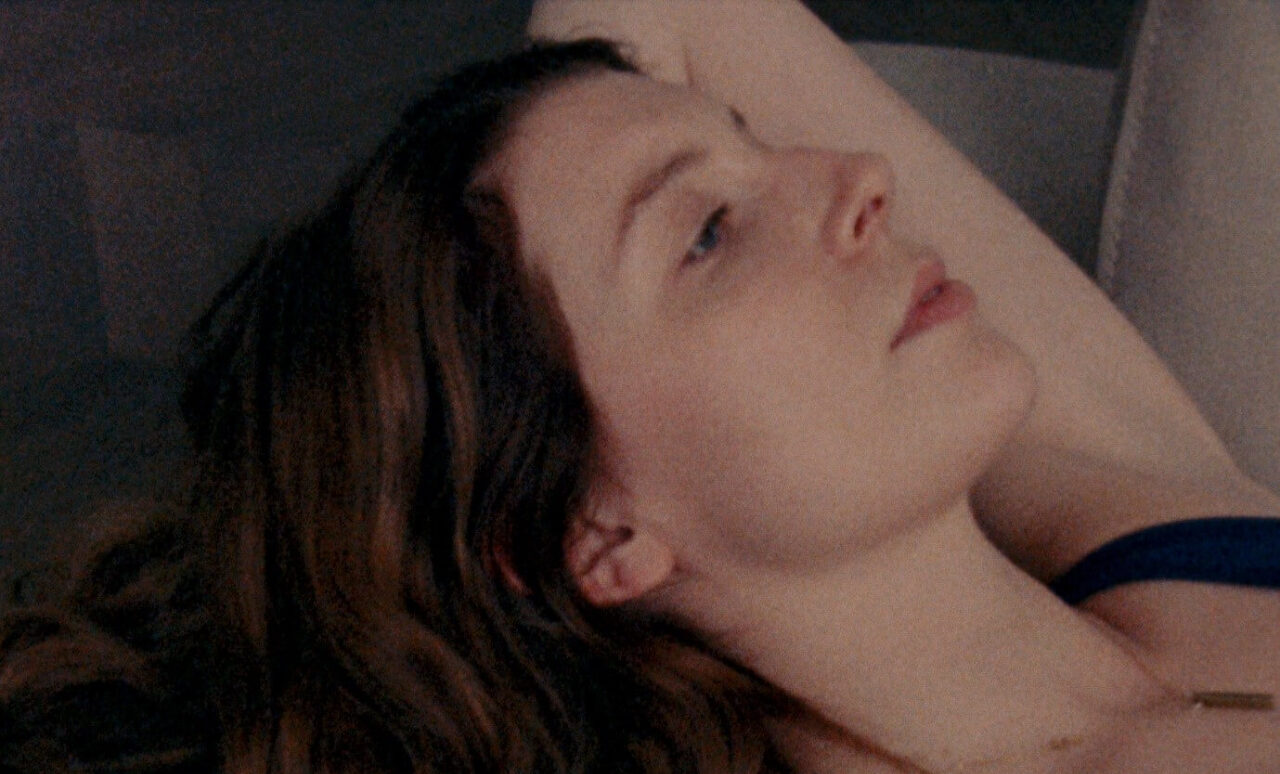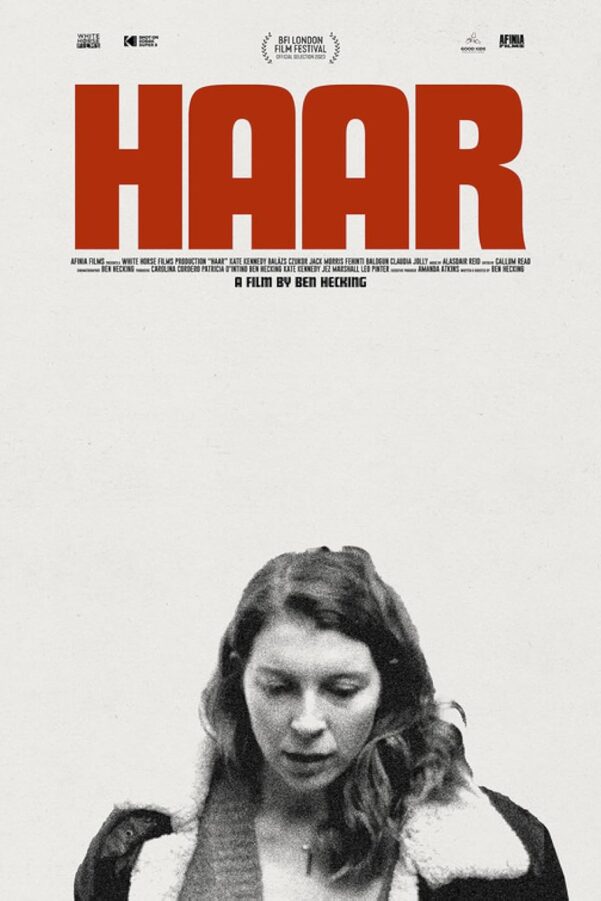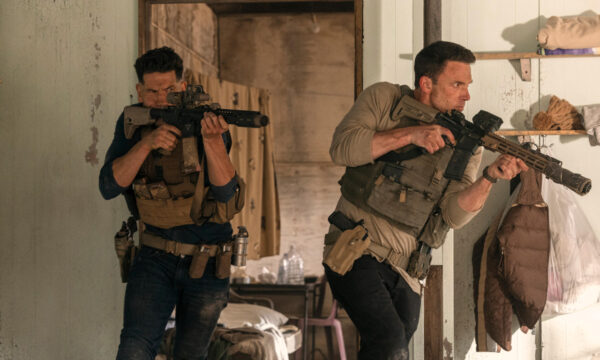“It’s not a passive film, it’s a film you have to engage with”: Kate Kennedy and Ben Hecking on Haar at London Film Festival 2023

Written and directed by Ben Hecking, Haar is a drama that rests solely on the performance of its main protagonist Jef (Kate Harding). Shot entirely on a Super 8 camera, the feature steers towards a dreamlike quality as we watch the film unfold over 24 hours of her life. Her busy job as production manager puts her away on location in Budapest but soon she is drawn to return home after the project comes to a close and must await the news of a second series being commissioned.
Whilst there, she finds fleeting connections that shape who she is, make her feel the nature of her job and pull her away from the tethered life she once had. She contemplates the idea of an unwanted pregnancy with someone she cannot connect emotionally with and also the devastation of some news that makes her acutely more aware of her detachment from her old life. Her lack of emotional depth as Jef is captured beautifully and viewers are left wondering where these layers are kept and whether she has pushed them away in place of her career.
The Upcoming had the pleasure of speaking to Kennedy and Hecking about what this film means to them, the choices that the characters make and what they hope viewers will take away from the feature.
What is the film Haar all about, what can viewers expect when they watch it?
Ben Hecking: In terms of the story, it takes place over 24 hours and it’s about a young woman in her early 30s who works in the film industry. She’s come to the end of quite a long-running TV series and is dealing with the burnout that comes with that. She’s been left in Budapest to wrap this up and deal with some of the issues that have been left behind in the production. She has had one of the worst days in her life from a professional and personal point of view, too. So it’s a character study of this woman who has lost her sense of identity as she’s so good at playing roles for different people and adapting her personality to suit them because that’s part of the job but her core sense of self is absent. She gets some news from home that forces her to think about a memory that she has misremembered, so she comes to terms with how slippery our memories are and how easily we can bend narratives. It’s packed quite a lot in but essentially it’s about someone who has lost their way and is trying to find a way forward.
Can you talk to us about your character Jef? She’s a complex and intriguing role to play. How did you prepare to play her?
Kate Kennedy: Well luckily I’ve known Ben for a while, and so when he wrote the first draft, because of COVID-19, we were gifted quite a lot of time, so we had time to work on the script and really dive in and suss out exactly who Jef was from all different angles and approaches. So, the preparation for Jef was much longer than we thought it would be, which was a godsend. The preparation was always workshopping the script or testing the camera it was shot on and that just really helped get into the bones of Jef physically from very early on. Little things we had like the jacket she wears, that was Ben’s and we had that a year before and just wearing that carries a certain kind of weight.
Can you talk about the cinematic approach and the filming process? You shot it all on a Super 8 camera, why did you choose to use that?
BH: I trained as a cinematographer and I was very lucky that at the school I went to, we got to shoot on celluloid and digital, and I just always loved film and photography. I still almost exclusively use film, which is getting very expensive these days, but I still persist. As a cinematographer, I’d made a bunch of films that were very low-budget and with tiny crews and I wanted to do Haar in the same way. But, using the apparatus that goes along with 16mm is actually quite difficult, so we shot some tests on Super 8 during the workshop process and I just loved the quality of it and it fits thematically into that sense of nostalgia. Most people associate it with either flashback sequences in bigger films or series like The Wonder Years or grandparents’ wedding videos, things like that. It gives instant nostalgia but it gets used a lot for fashion shoots or music videos as a kind of throwaway, which is great, but you keep all the scratches in, the sprocket holes, it’s kind of an effect. I mean, it’s the same film stock that Nolan used on Oppenheimer, it’s cut from the same celluloid, so I thought, what if you treat the camera with the same respect as you would afford a film shot on 35mm? Dealing with it after though… I mean, it was a 19-day shoot but it took 18 months to handle post-production and it took three and a half weeks to sync it. That was a real eye-opener, as it’s not really been done before. I took six weeks restoring the film frame by frame to bring it up to a level, so the viewer would be really aware of its Super 8 origins. It was a real challenge, it has to be said. Having done it now, if I did it again, I’d go in with my eyes wide open. It was quite a particularly unique Super 8 camera, too, because it’s not a conventional Super 8 plastic cartridge, it’s a modification of a 16mm camera, which allows you to shoot for longer. So you get five minutes instead of two and a half. There are some emotional dialogue bits that wouldn’t have worked if they had been cut after the short time, too.
Talking about the job Jef has, there’s a moment in the movie where someone points out it’s, “Family one minute, strangers the next,” which feels very true to a job in the film industry. What was it like exploring that type of narrative?
KK: I’m very interested in the notion of being away from home and what it takes to keep up any type of relationship, especially at that age where everyone is leading down very different paths. I think we were very keen on the parental thread because, again, at that age, it’s a very crucial time where inevitably everyone will go through that once-in-a-lifetime experience. I think we were inspired by our friends who work in the industry and dedicated their lives to it to the point where they get somewhere and they’re at the end of their tether and wonder: what’s the next chapter?
Obviously, you filmed in Budapest, which is a beautiful city, but this film explores the notion of travel for work and that detachment from a place you have when the job ends, which you play so beautifully, can you talk about that?
KK: I’d just done a ten-month job in Budapest. I was between series in Budapest, so it felt quite raw and very relatable at times.
BH: It was your suggestion that we film there. I mean, I knew friends that had filmed there before, the way the light comes down the streets and the buildings and architecture, it’s an incredibly beautiful city, but it’s a city that’s not really used as Budapest that often; it often doubles as Paris or somewhere, so it was nice to go in with a touristic eye. Often on the job, when you go away, you don’t get to see much of the city. It’s the hotel or apartment, then the cab ride to the location, then you spend all day there and your time off is spent in bed, not exploring the places. Kate does this so well: this weird exhaustion that hits you at a certain point in your life. Also, it’s the time in our lives when you have that realisation that your parents are old now, that feeling of mortality. We don’t deal with that very well in the West, so that was something we tapped into too – the conversations you wish you’d had. I really want people, irrespective of the film, to think, “I really should call my mum or dad and not ignore that phone call.”
Music plays a big part in this, too, can you talk about that element?
BH: It’s actually Kate who’s playing the flute in the park, she’s a fantastic flautist. There were certain tracks and song choices that were quite important at the script stage. The opening track is linked to a very specific memory I have. The lyrics are particularly poignant as well, and one of the reasons she’s called Jef is because of the song at the end of the film. It’s sad and wistful but translated it says “Don’t worry, everything is going to be okay,” so it’s a triumphant ending. Then there’s the score from this amazing composer Alasdair Reid, who was also the sound designer, and I think he’s delivered a beautiful score that perfectly encapsulates the mood.
Jef is a very strong, independent, working woman. Did you feel you could relate to her as a character?
KK: Yes, I love the theme of this film because you see so many female protagonists that are hot messes or they come to a point where they explode or self-destruct and obviously there’s room for that too but I love the fact that Jef is a trooper. She just keeps on paddling, which is the characteristic that I know most about a lot of my friends and what they go through. They just keep on going, and so often it’s a male characteristic, going through all this stuff and not talking about it but I definitely can relate to that. I mean, Jef doesn’t tell anyone her dad is dead for a good six hours, she just keeps it all in. I just really love her as a character, how internal she is and the turmoil she’s going through throughout the whole piece. I think she’s really special.
There are themes of loss and love throughout the film, what do you hope viewers will take away from watching this?
KK: Kind of what Ben said about calling your parent and actually the kindness of strangers is also a really beautiful part of this too, like László who works as her driver.
BH: It’s a surprising film in many ways. It’s not a passive film, it’s a film you have to engage with. I think the Super 8 almost forces you to engage with it, as it takes a little while to get used to it, but I think it’s surprising because it never quite goes where you think it will. You don’t ever quite know what Jef is thinking until the end. This outpouring to a total stranger: sometimes the people you don’t know, those random encounters, can completely change your life. There’s ambiguity at the end there, too. We never quite know what Jef will do, will she change her job? Will she be a better child to her mother? Is she going to be there for support? I suspect not.
Ezelle Alblas
Haar does not have a UK release date yet.
Read more reviews and interviews from our London Film Festival 2023 coverage here.
For further information about the festival visit the official BFI website here.
Watch the trailer for Haar here:


























Facebook
Twitter
Instagram
YouTube
RSS